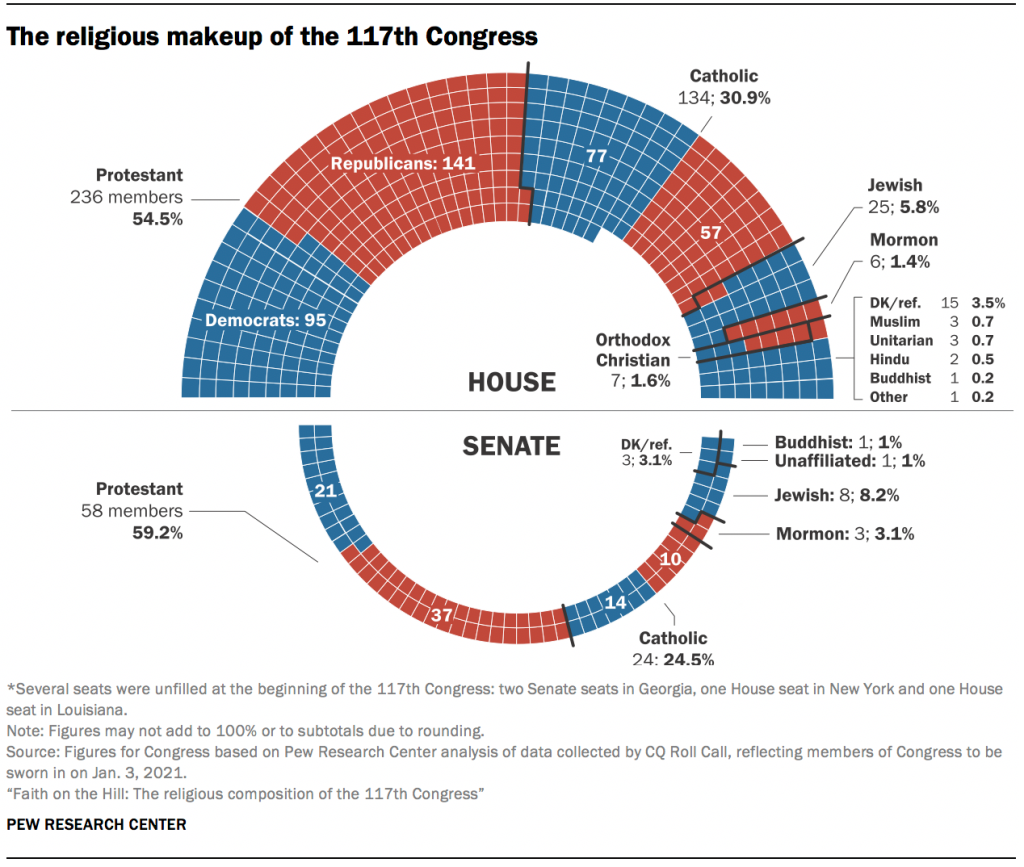Pew Researchers presented data on 4 January 2021 about the religiosity of the 117th US Congress. The data indicate most members of Congress identify as Christian and most of them are Protestant.
Of course, we should add to the Pew data the US President, Joe Biden--one of the few Catholic Presidents. Add to that the Justices on the Supreme Court where 7 of the 9 are Catholics.
Data indicate, all branches of the US government are run by people who overwhelmingly identify as Christian.
Pew researchers make a point that the religious beliefs of the members of Congress are not like those of the general public. For example, only Sen. Sinema of Arizona identifies as religiously unaffiliated in contrast to 26% of US adults.
When it comes to Christianity, 88% of Congress identify as Christians compared to 65% of the general public.
Age is a related factor. Older Americans are more religious than are younger Americans. And members of Congress are older than the average American. Although, even considering age, the percentage of Christians is higher in Congress than among similarly aged Americans.
There are a few more Jewish members of Congress (6%) than adults in the general public (2%).
Members who identify with other religious groups (Buddhists, Muslims, Hindus, Unitarian Universalists) match the percentages in the US.
Christian Groups
Catholics are the largest group by far with 158 or nearly 30%. The only Protestant group above 10% are the Baptists at 12.4%. Methodists at 6.6% are the only ones above 5% although the Anglicans/Episcopalians (4.8%), Presbyterians (4.5%), and Lutherans (4.1)are close.
So, which Christian groups are at the bottom? The percentages make no practical sense because they are below 1% so here are a few numbers: Pentecostal = 2, Adventist = 2, Reformed and Pietist = 1 each.
Implications
As far as I can tell, the implications for different laws have not changed much since the previous Congress. The composition has not changed much. And political party affiliation along with the associated voter support will hold more sway than voices of religious leaders. After all, you cannot hold the position without being elected. And many are focused on re-election in 2022--that's next year!
On social issues that divide Americans, it is noteworthy that the antiabortion legislation from 2018 did not become law despite support from many conservatives. That January 1, 2018 attempt did not propose a ban on abortion but sought to set a limit (See Abortion Politics and Lives February 2018).
Find more details at the Pewforum summary.
I write about Psychology and Religion. Please subscribe to this blog. Also, if interested, please check out my books and connect.
Links to Connections
Checkout My Website www.suttong.com
See my Books
FOLLOW me on
FACEBOOK Geoff
W. Sutton
TWITTER @Geoff.W.Sutton
PINTEREST www.pinterest.com/GeoffWSutton
Read published articles:
Academia Geoff
W Sutton
ResearchGate Geoffrey W Sutton

Comments
Post a Comment